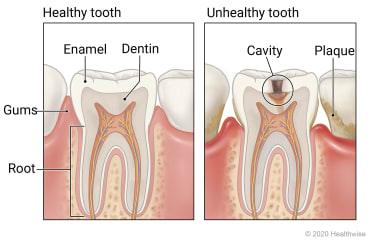Tooth Decay in Children: Care Instructions
Overview

Tooth decay is damage to a tooth caused by plaque. Plaque is a thin film of bacteria that sticks to the teeth
above and below the gum line. If plaque isn't removed from the teeth, it can build up and harden into tartar.
The bacteria in plaque and tartar use sugars in food to make acids. These acids can cause tooth decay and gum
disease.
Any part of your child's tooth can decay, from the roots below the gum line to the chewing surface. Decay can
affect the outer layer (enamel) and inner layer (dentin) of your child's teeth. The deeper the decay, the
worse the damage.
Untreated tooth decay will get worse and may lead to tooth loss. If your child has a small hole (cavity),
your child's dentist can repair it by removing the decay and filling the hole. If the tooth has deeper decay,
your child may need more treatment. A very badly damaged tooth may have to be removed.
Follow-up care is a key part of your child's treatment and safety. Be sure to make and go to all
appointments, and call your dentist if your child is having problems. It's also a good idea to know your
child's test results and keep a list of the medicines your child takes.
How can you care for your child at home?
-
Give your child acetaminophen (Tylenol) or ibuprofen (Advil, Motrin) for pain. Be safe with medicines.
Read and follow all instructions on the label.
-
Put ice or a cold pack on the cheek over the tooth for 10 to 15 minutes at a time. Put a thin cloth
between the ice and your child's skin.
How can you prevent it?
-
Don't put your baby to bed with a bottle of juice, milk, formula, or other sugary liquid.
-
Offer liquids in a cup rather than a bottle.
-
Provide healthy foods for your child. These include fruits, vegetables, lean proteins, whole grains, and
low-fat dairy products.
-
Gently brush your child's teeth after they eat sugary or sticky foods, such as raisins.
-
Help your child brush their teeth in the morning and night. Help them floss once a day.
-
Take your child for checkups and cleanings at the dentist every 6 months.
-
Ask your child's dentist about fluoride treatments or sealants.
-
Try not to smoke around your child. And try to keep others from smoking around your child.
-
To help prevent the spread of decay-causing bacteria, don't feed your baby from utensils you have used.
When should you call for help?
 Call your
dentist now or seek immediate medical care if:
Call your
dentist now or seek immediate medical care if:
Watch closely for changes in your child's health, and be sure to contact your dentist if
your child has any problems.
Current as of: August 6, 2023
Content Version: 14.0
Care instructions adapted under license by your
healthcare professional. If you have questions about a medical condition or this instruction, always ask
your healthcare professional. Healthwise, Incorporated disclaims any warranty or liability for your use of
this information.